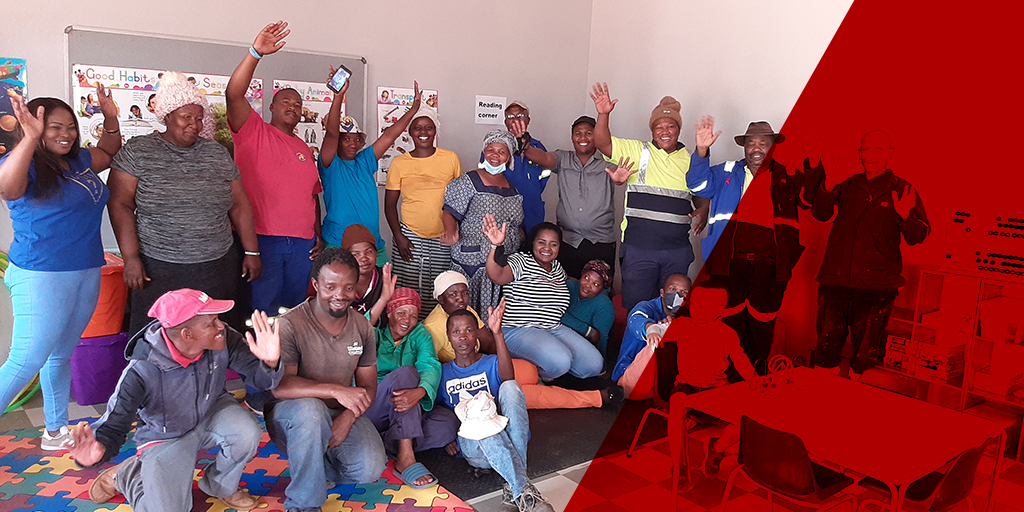Drilling contractor and technology provider Rosond of Midrand has a long legacy of successful corporate social responsibility (CSR) initiatives. Recent examples include a wide-ranging food-parcel distribution project, refurbishing a crèche in Groenwater in the Northern Cape and a major donation to Nokuphila Primary School in Midrand to assist with teacher training and development.
Due to its involvement in the mining industry, in commodity sectors as diverse as iron ore, platinum, gold and coal, Rosond has a broad exposure to a range of mining houses, including Anglo American’s Kumba Iron Ore operation in the Northern Cape. “The fact that we are a contractor and not a mining company per se means that we have to plug into the social and labour development plans of our clients,” explains Rosond HR Manager Jacob Matlou.
Matlou works hand-in-hand with Transformation Manager Ian Tshephe and Employee Relations Officer Freddah Motloung to not only identify potential projects in affected communities, but to implement and monitor these projects as well. “We follow-up in order to gauge what impact a particular project has had on a community and what lessons we can learn from for the future.”
Tshephe explains that Rosond’s CSR policy is inherently flexible due to the contractor’s broad exposure to the mining industry. “What we do as a company in terms of these initiatives is directly based on the specific requirements of our clients, which range from the Northern Cape to Carletonville and the Rustenburg Platinum Belt.”
Motloung points out that Rosond also has a responsibility to initiate projects in the Midrand area where its head office is based, which is why its recent food-parcel drive included the Ivory Park community. The drive was partly in response to the socioeconomic impact of the Covid-19 pandemic, which has had a particularly devastating impact on the most vulnerable members of society. Rosond has been donating food parcels to its host communities from the beginning of the national lockdown to date.
Another host community is Groenwater just outside Postmasburg, where Rosond has renovated and refurbished a crèche catering for children aged 0-6, therefore assisting young mothers with child care. It is managed and run by female volunteers in the local community.
“With the assistance of the community members, we were able to paint the centre and redo the garden. The water supply and plumbing also had to be refurbished, and therefore we engaged local suppliers to assist,” adds Motloung. New toys and various supplies were purchased for the children, in addition to equipment to aid the teachers in providing early leaning development.
Rosond also recently made a major donation to the Nokuphila Primary School in Tembisa. Managed by the Love Trust, the school caters for children from vulnerable backgrounds and affected by HIV/AIDS. With the assistance of the Department of Social Development, the Love Trust trains, accredits and mentors Early Child Development Teachers who are currently untrained and unqualified to teach at this level. To date, 500 students have graduated, with 350 currently in the programme. There are nine Teacher Training Centres nationwide, with the Nokuphila Teacher Training Academy as its flagship project.
“Our aim is to embed or entrench ourselves in all of the local communities affected by the client projects we are involved with. Of course, we want to make a name for ourselves as a major contractor carrying out work for Anglo American, for example. However, it is equally important that we are known in all of these communities for having a significant impact on the daily lives of residents,” elaborates Tshephe.
Rosond has a Transformation Committee in place that meets on a regular basis to evaluate all CSR projects. “We tend to favour those projects that yield a more meaningful output and that reach a broader community so as to create a legacy story. We embark on a complete value chain from A to Z, from the actual implementation to monitoring and evaluation,” notes Tshephe.
Matlou adds that the benefit of piggybacking on the social development plans of its clients means its own CSR initiatives have a direct impact where it is needed the most. “Our clients are familiar with their own host communities and which projects need to be implemented for the maximum benefit. Therefore when we align with them it not only increase the impact of our own intervention, it also benefits community relations and prevents any potential friction or conflict.”
Looking to 2021, Motloung acknowledges that the Covid-19 pandemic has resulted in an increased need for CSR projects in the mining industry. “Our Transformation Committee will meet early on this year in order to begin the process of determining where our immediate focus is going to be,” she concludes.






